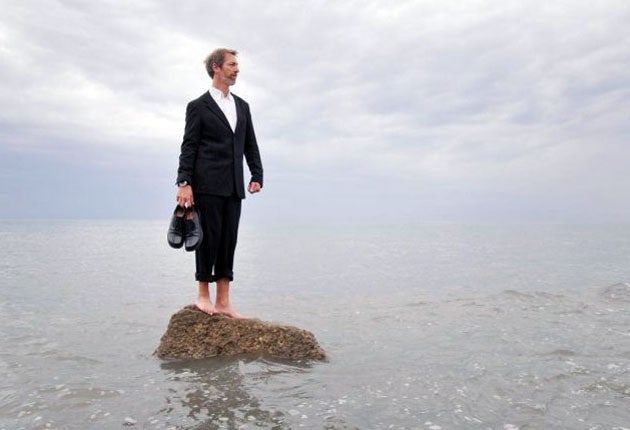The man who set sail on an island... and other works chosen for the Cultural Olympiad
Arifa Akbar examines how Britain hopes to inspire the world in 201

Your support helps us to tell the story
From reproductive rights to climate change to Big Tech, The Independent is on the ground when the story is developing. Whether it's investigating the financials of Elon Musk's pro-Trump PAC or producing our latest documentary, 'The A Word', which shines a light on the American women fighting for reproductive rights, we know how important it is to parse out the facts from the messaging.
At such a critical moment in US history, we need reporters on the ground. Your donation allows us to keep sending journalists to speak to both sides of the story.
The Independent is trusted by Americans across the entire political spectrum. And unlike many other quality news outlets, we choose not to lock Americans out of our reporting and analysis with paywalls. We believe quality journalism should be available to everyone, paid for by those who can afford it.
Your support makes all the difference.The task for the competition was to produce a work of art so sensational that it would raise the hairs on the back of the judges' necks. So the artist, Alex Hartley, thought: "Why not tow a newly discovered island, the size of a football field, from the high Arctic to the South-west of England? And why not navigate it across Blighty's waters accompanied by a travelling embassy?" The judges loved it, and yesterday he became one of 12 artists out of 2,000 applicants to be chosen to produce his work as part of the Cultural Olympiad, marking the cultural side of the Olympics.
The Games' chairman Sebastian Coe, Olympics minister Tessa Jowell and Arts Council executive Moira Sinclair announced that £5.4m would be spent on the public art project, entitled Artists Taking the Lead, which will involved artists from all over the country.
The other commissioned projects range from a spinning cloud sculpture visible for hundreds of miles to a full-size football pitch created within Scottish woodlands and an environmentally sustainable water mill.
The winning artists in nine regions of England, as well as Wales, Northern Ireland and Scotland, will now start working on their pieces.
Ms Sinclair, executive director of the Arts Council in London, dismissed those who cautioned against spending such a substantial amount of money on community arts projects in the middle of a recession, arguing that the initiatives offered something positive during troubled times. "We are always looking to the future, and 2012 is two-and-a-half years away. By then we will be coming out of the recession and we will be wanting to see things about how confident we are and how creative we are as a nation. This is about our environment and our imagination. I do not think that we can hold back on investing in our artists because this will be saying something special about us and Britain," she said.
Lord Coe said the winning commissions would be "the catalyst for a truly national showcase of culture inspired by the London 2012 Olympic Games and Paralympic Games". Ms Jowell added that the Olympiad should be regarded as equal in importance to the Games themselves, rather than as an afterthought. "Nobody should be under any illusion that we see the Cultural Olympiad as an equal partner to the Olympic and Paralympic Games," she said. "You will recognise the sheer excitement, imagination and reverence of all the offerings. Each one of them will make a strong regional statement and remind people about the triple nature of the Olympic identity. Of the 12 pieces – they will lift your spirit and many of them will make you smile."
Initially, the artists were asked to come up with an inspirational idea. "We said, 'Give us an idea that will make the hairs on the back of our necks to stand up'," Ms Sinclair said.
All the pieces will be rooted in particular regions and will engage with the public to "redefine what public art will mean in 2012", she added.
Three 30ft crocheted lions will refer to Richard the Lionheart and reflect the textile industry of the East Midlands, while Northern Ireland's largest ever chorus will assemble in a warehouse made from people's personal possessions. A giant mechanical puppet of Lady Godiva will grace the streets of Coventry before making its journey to London, and LED panels on the roofs of London bus stops will allow commuters to express themselves as they travel.
Among the more notable winners was nowhereisland, Alex Hartley's idea of bringing an Arctic island which he discovered in 2004 in the archipelago of Svalbard, a Norwegian territory, to England. According to the Arts Council, he will navigate the coast accompanied by a travelling embassy to explore "issues of climate change and land ownership".
In another initiative, Marc Rees will create a silver bird-like structure out of an abandoned aeroplane, which he will take with him as he hikes around Wales.
The project is one of 10 to be announced as part of the Cultural Olympiad over the next two years. An Arts Council spokeswoman said the panel had tried to choose a mixture of young emerging artists as well as more established names. Craig Coulthard, who was chosen to represent Scotland, is relatively early in his career, while the likes of Anthony McCall – who is representing the North-west – Rees and Hartley have international reputations.
"We would have been disappointed to have all 12 winners dominated by terribly big names. This was all about encouraging a new generation of artists," she said.
In separate initiatives, £3m has been set aside for a London festival and £600,000 for Unlimited, a huge arts disability programme.
Join our commenting forum
Join thought-provoking conversations, follow other Independent readers and see their replies
Comments